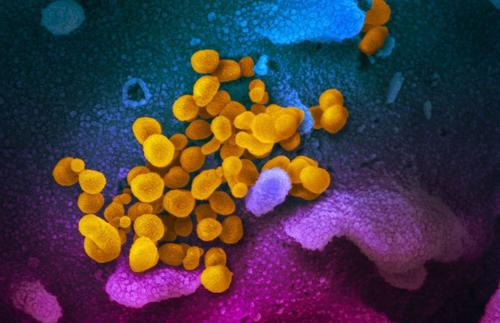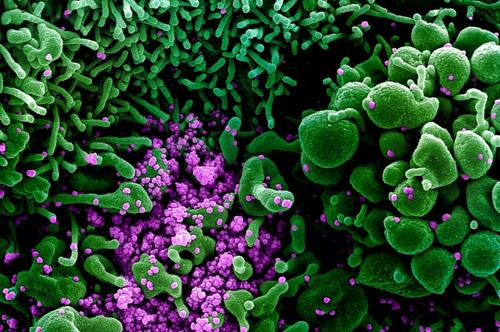‘Mutant’ Coronavirus: Six Experts Answer Your Questions
Authored by Ethen Kim Lieser via 19fortyfive.com,
Even as nations around the world are ramping up their respective vaccine campaigns, the identification of a new variant of the novel coronavirus in the United Kingdom has spawned fresh fears that the ten-month-long pandemic may continue to accelerate that to what some are calling a new “mutant coronavirus” strain.
The United Kingdom has already stated that the new strain, also known as SARS-CoV-2 VUI 202012/01, could be up to 70 percent more transmissible than the original strain of the virus.
Based on early data, the variant could “potentially be more rapidly transmissible than other circulating strains,” the U.S. Centers for Disease Control and Prevention added.
England’s Chief Medical Officer Chris Whitty and Chief Scientific Adviser Patrick Vallance said that there was no evidence to suggest that the new mutant coronavirus strain is more deadly. They did, however, admit that the variant is responsible for 60 percent of new infections in London, which have nearly doubled within the past week.
Mutant Coronavirus: What We Know
“Given that we’re entering a period of inevitable mixing, I think there will be some increases in numbers over the next few weeks,” Vallance said in a Monday press briefing.
UK officials have also asserted that the newly rolled out coronavirus vaccines appear to be just as effective against the new strain—but did caution that more research is needed. Both Pfizer and Moderna, meanwhile, are in the process of testing out their vaccines on the virus.
In order to shed more light on this important topic, we reached out to several medical experts across the United States to get their personal opinions on this new mutant coronavirus strain. Here is what they had to say
Dr. Andrew Badley, head of the Mayo Clinic’s COVID Task Force
“The Mayo COVID Task Force is closely watching developments and ongoing research on the so-called UK mutations with the virus. We know that the virus mutates one to two times a month, so it is not a surprise. But Mayo is somewhat concerned as there are upwards of twenty potential and separate mutations involved here. Each mutation carries the possibility of impacting the six developmental phases in the virus lifecycle. The ones we know about can increase the ease of virus entry into cells and may help evade antibodies. The UK mutation has become more widespread since first discovered in September. We continue to follow the ongoing laboratory research on this and monitor its prevalence. To date, there is no evidence that the new viral variant either escapes immunity or resists current therapies—so that is good news for now.”
Colorized scanning electron micrograph of an apoptotic cell (green) heavily infected with SARS-COV-2 virus particles (purple), isolated from a patient sample. Image captured and color-enhanced at the NIAID Integrated Research Facility (IRF) in Fort Detrick, Maryland. Credit: NIAID
Dr. Dean Winslow, infectious disease specialist at Stanford Health Care
“The recently described SARS-CoV-2 variant has several substitutions both in the envelope spike protein and outside of that region that make this variant more transmissible between people. However, it does not appear to be more virulent or cause more severe disease. While it has not been specifically studied, these changes are not predicted to adversely affect the ability of the currently fielded vaccines to provide protection.”
Dr. Cathy McCarty, genetic epidemiologist and professor at the University of Minnesota Medical School, Duluth Campus
“Epidemiology data initially indicated a surge in cases in the (southeast) of England, and then molecular epidemiology data were used to identify this new virus strain with far more mutations than have been observed during this pandemic. There are no data currently to indicate that this mutated virus is more deadly, but deaths lag behind diagnoses by several weeks and the uptake in cases was first noticed December 8, so increased deaths from the mutation would likely just be starting to happen now. Mutation of a virus is normal, but this is unusually fast. Often, when viruses mutate, they become less deadly, for the simple reason that if they are going to survive, it makes sense to be able to spread quickly but to become less deadly, so your host can live to spread it to other people. The potential impact on vaccine efficacy is definitely a concern. The mutations are affecting the spike protein on the surface of the virus. The vaccines that are being used now act by creating a spike protein for our bodies to mount an immune response.”
Dr. Ian Kim, physician and professor at the University of California Davis School of Medicine
“There is no evidence that the new variant causes more severe illness. It may spread more easily to more people, but any individual who catches this won’t necessarily get sicker. We know that the COVID-19 virus has a slow rate of random mutations, and scientists have been monitoring mutations since the beginning of the pandemic. No mutations seen thus far come close to evading the vaccines that have been developed. Further research may change these answers, but that’s what we know at this time.”
Dr. Pavitra Roychoudhury, instructor in Department of Laboratory Medicine and Pathology at University of Washington
“Similar questions arose (about the virus being deadlier) when we saw the D614G spike mutation rise in frequency globally, and multiple studies have shown that although associated with higher viral loads, there was no association with clinical outcomes. What we do know so far is that the variant is associated with higher viral loads, but further analyses of clinical outcomes will help get at this question of whether the variant is deadlier. I’m sure this data will come soon. The worry (about vaccine efficacy) is that the changes to the spike protein could lead to escape from the antibody response from vaccination, leading to vaccinated people not being protected from the disease if they get infected by this particular variant. At this point, we think that it’s unlikely to lead to complete loss of protection from the vaccine, and I am sure a number of experiments are underway around the world to look at this using different approaches.”
Dr. Stanley Perlman, virologist and professor of microbiology and immunology at University of Iowa Health Care
“So far, all of the data show that it is not more virulent and that vaccines will work against it. Its enhanced spread in the UK suggests that it transmits better, but this is not rock solid yet. It is a conclusion reached from modeling. The only possible negative effect is that it may evade single monoclonal antibodies, such as those used in the Eli Lilly or Regeneron preparations. This is not known yet.”
Tyler Durden
Wed, 12/23/2020 – 14:00
via ZeroHedge News https://ift.tt/2WG5lQR Tyler Durden

